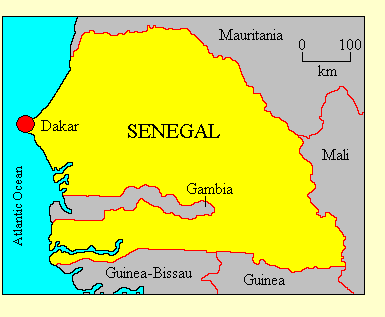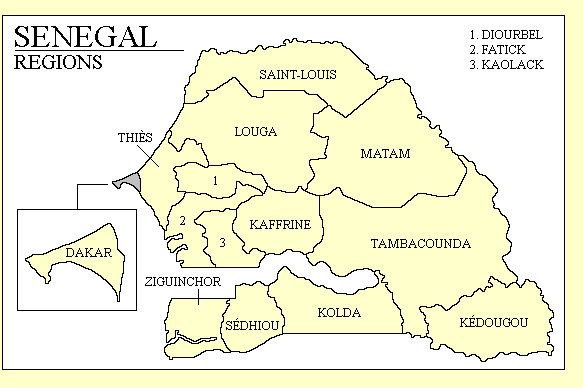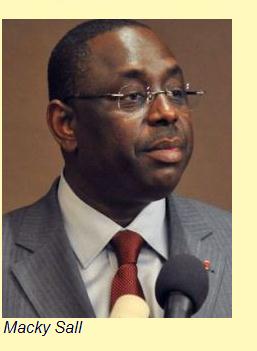
REPUBLIC OF SENEGAL
Official name: Republique du Senegal (Republic of Senegal)
Location: West Africa
International organisations: African, Caribbean and Pacific Group of States, African Union,
Non-Aligned Movement, Organisation Internationale de la Francophonie, Organisation of Islamic
Conference, United Nations, World Trade Organisation
Borders: Gambia, Guinea, Guinea-Bissau, Mali, Mauritania
Coastline: North Atlantic Ocean
Land area: 196,190 Km2
Population: 13,700,000
Ethnicity: Almost the entire population of Senegal is of West African stock. The
largest ethnic groups are the Wolof (43.3%), Pular (23.8%), Serer (14.7%), Jola (3.7%),
Mandinka (3%) and Soninke (1.1%).
Languages: French is the official language and is the language of government and
business. Many African languages are spoken, Wolof being the most widely used.
Religion: Sunni Moslem 94%, Catholic Christian 5%.
Form of government: Presidential democratic republic. Senegal is divided into ten
regions.
Capital: Dakar
Constitution: The new Constitution of the Republic of Senegal came
into effect on 7 January 2001.

Head of state: The President, elected by direct universal suffrage for a five-year term (previously
seven).
Head of government: The Prime Minister, appointed by the President. The Prime Minister
is the leader of the largest party in the legislature and is in theory accountable to it.
Abdoul Mbaye
was appointed Prime Minister in April 2012.
Legislature: Senegal has a bicameral legislature. The
National Assembly (Assemblee Nationale) has 150
members, elected for five-year terms from multi-member constituencies. The Senate consists of
65 members appointed by the President and 35 members elected by public officials.
Electoral authority: The National Election Observatory (ONE) administers national elections. It
appears to have no website.
• Freedom House 2011 rating: Political Rights 3, Civil Liberties 3
• Transparency International Corruption Index: 29% (112 of 178 countries rated)
• Reporters Without Borders Press Freedom 2010 Index: 74% (75 of 178 countries rated)
• Heritage Foundation Economic Freedom 2010 Index: 55% (120 of 179 countries rated)
Political history
Senegal was France's first colony is sub-Saharan Africa, with settlement beginning in
1626. As such it had unusual privileges, including the right to elect a member of the French
legislature from 1848 and a local Assembly from 1879. Senegal became part of French West Africa
in 1895 and in 1902 it was extended inland to its present borders. It became self-governing
in 1958 and fully independent in 1960.
Senegal's first president was Leopold Sedar Senghor, a distinguished poet and a
member and minister in the French National Assembly. In 1962 Senghor established a
socialist one-party state and retained power without opposition until his retirement in 1980. From
1982 to 1989 Senegal was involved in an unsuccessful federation with Gambia.

Senghor's successor, Abdou Diouf, abandoned socialism and allowed a return to democratic
government, the genuineness of which was proved when he was defeated for re-election in 2000 by
Abdoulaye Wade. Wade was comfortably re-elected in 2007 against a fragmented opposition. His party,
the Senegalese Democratic Party (PDS), is the dominant party in the
legislature, as part of the Sopi Coalition ("Sopi" is a Wolof word for change), since Diouf's party, the
Socialist Party of Senegal, and other opposition parties,
boycotted the 2007 legislative elections.
Wade was constitutionally barred from seeking a third term in 2012, but ran anyway in open defiance
of the law. In a breakthrough election for African democracy, he was comfortably defeated by
Macky Sall, former Prime Minister and leader of
the Alliance for the Republic.
Freedom House's 2011
report on Senegal
says: "Senegal is an electoral democracy. The National Observatory of Elections has credibly overseen legislative and presidential polls since its creation in 1997...
There are more than 75 legally registered political parties in Senegal. Major parties include the ruling PDS and the opposition PS. The PDS currently controls most
national political offices, but the opposition performed well in the 2009 municipal elections...
Corruption remains a serious problem... Freedom of expression is generally respected, and members of the
independent media are often highly critical of the government despite the risk of criminal defamation
charges. There are approximately 20 independent radio stations and many independent print outlets, but
the government owns the only national television station... Freedoms of association and assembly are guaranteed...
Human rights groups and other nongovernmental organizations operate freely in Senegal...
The judiciary is independent by law, but poor pay and lack of tenure expose judges to external influences and prevent the courts from providing a proper check
on the other branches of government."
Updated May 2012
|


